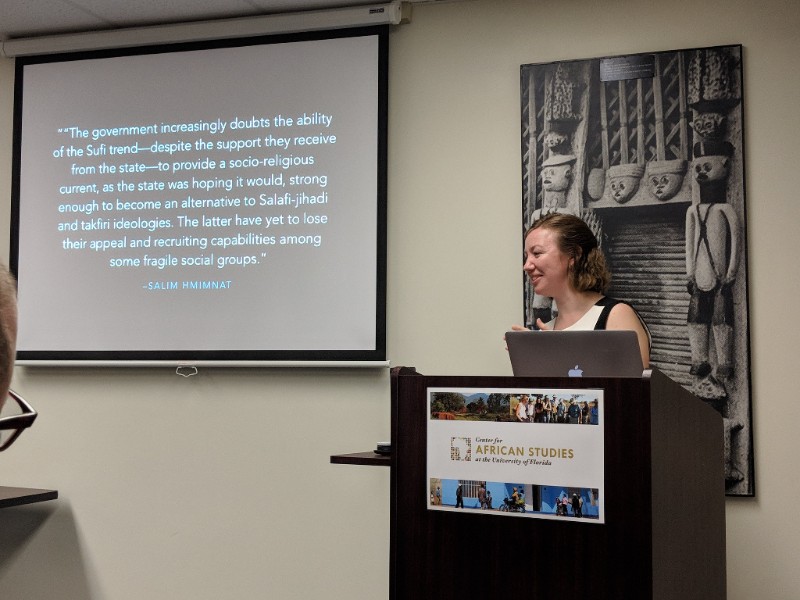 On March 30, Dr. Ann Wainscott gave a Baraza lectured titled, “Bureaucratizing Islam: Morocco and the War on Terror.” Dr. Wainscott is assistant professor of political science and earned her Ph.D. from UF in 2013. Her publications include: “Religious Regulation as Foreign Policy: Morocco’s Islamic Diplomacy in West Africa” Politics and Religion (2018); Bureaucratizing Islam: Morocco and the War on Terror (2017); and “Defending Islamic Education: War on Terror Discourse and the Politics of Public Religious Education in Contemporary Morocco” Journal of North African Studies (2015).
On March 30, Dr. Ann Wainscott gave a Baraza lectured titled, “Bureaucratizing Islam: Morocco and the War on Terror.” Dr. Wainscott is assistant professor of political science and earned her Ph.D. from UF in 2013. Her publications include: “Religious Regulation as Foreign Policy: Morocco’s Islamic Diplomacy in West Africa” Politics and Religion (2018); Bureaucratizing Islam: Morocco and the War on Terror (2017); and “Defending Islamic Education: War on Terror Discourse and the Politics of Public Religious Education in Contemporary Morocco” Journal of North African Studies (2015).
The lecture focused on her research on Moroccan religious reforms, which were implemented as a counter terrorism measure following the 2003 Casablanca bombings. The bombings were the first major terrorist attack in Morocco and resulted in an overhaul of religious policy by the state. The Moroccan government now controls religious bureaucracy including religious education, printing of the Quran, recitation of prayer, and institutions of higher religious learning. Because religious management and policy changes were well organized and financed, Dr. Wainscott argues that counter terrorism was only one objective of these changes. State involvement in religious policy fulfills two objectives: it demonstrates the state’s proactivity in dealing with terrorism and it discourages dissent from religious elites. Dr. Wainscott’s lecture described the complex incentive structure formed between education, higher education, and employment in Morocco following the bureaucratization of Islam.
She concluded the lecture by stating that the Moroccan strategy has its political advantages. It limits opposition from religious elites, gains international recognition and material benefits, and avoids condemnation of the international community. Moreover, this approach has significance beyond Morocco. She argues that the War on Terror has contributed to the “banalization” of Islam, and has created specific opportunities for states with religious identities. Also, religious policy changes made in response to terrorism can be used as a way to silence political opposition.